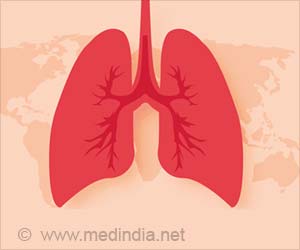AI is transforming respiratory diagnostics and critical care, focusing on early detection and system efficiency.

Artificial intelligence in respiratory care: perspectives on critical opportunities and challenges
Go to source).
‘Did You Know?
AI tools may cut lung disease diagnosis time by 50%, boosting survival chances. #aihealth #medindia ’





AI tools may cut lung disease diagnosis time by 50%, boosting survival chances. #aihealth #medindia ’
Advertisement
AI in Respiratory Diagnostics: Precision at Speed
Current assessment of intricate respiratory data from CT scans and spirometry and lung laboratory results remains time-consuming and leads to human error in manual interpretation by physicians. The diagnostic accuracy of AI systems improves, and so does their ability to reduce diagnostic durations(2✔ ✔Trusted SourceAI-powered respiratory diagnostics set to transform NHS lung care
Go to source).
By combining correctly trained algorithms with big data analysis, accurate assessments can be given for early-stage COPD and Asthma diagnoses. AI tools enable medical staff to perform early diagnoses, particularly for lung cancer identification, which enables patients to access immediate medical care that improves their chances of survival.
Advertisement
Critical Care and Predictive Monitoring
Healthcare staff use artificial intelligence technologies in ICU to monitor vital signs continuously for severe respiratory distress patients. Real-time ventilator and blood gas data analysis with patient vital signs allows local healthcare systems to predict healthcare decline while deciding ventilator removal procedures.Integration with National Health Systems: NHS Leading the Way!
Using AI, the National Health Service (NHS) creates an essential transformative tool to combat diseases affecting the lungs. In pilot projects, the use of AI diagnostics has been shown to successfully cut diagnostic times by up to 50%. Studies have demonstrated improved operational efficiency and improved system evaluation capabilities along with reduced workload for pulmonologists and radiologists.AI technology can offer targeted access to specialized medical care in areas with difficult access to healthcare facilities.
Challenges Faced with AI Driven Health Monitoring
- Data privacy and ethical considerations
- Manufacturing bias through algorithms combined with requirements from various dataset types
- Integration with existing clinical workflows
- Regulatory approval and clinician trust
The healthcare benefits that AI technology delivers come from its activity in critical care unit surveillance combined with national screening strategy implementation. Better technological integration supports AI as a vital healthcare solution for respiratory care that produces enhanced outcomes and decreases practitioner demands.
References:
- Artificial intelligence in respiratory care: perspectives on critical opportunities and challenges - (https://pmc.ncbi.nlm.nih.gov/articles/PMC11629173/ )
- AI-powered respiratory diagnostics set to transform NHS lung care - (https://www.healthcare-management.uk/ai-powered-respiratory-diagnostics-set-transform-nhs-lung-care)
Source-National Health Service, UK















